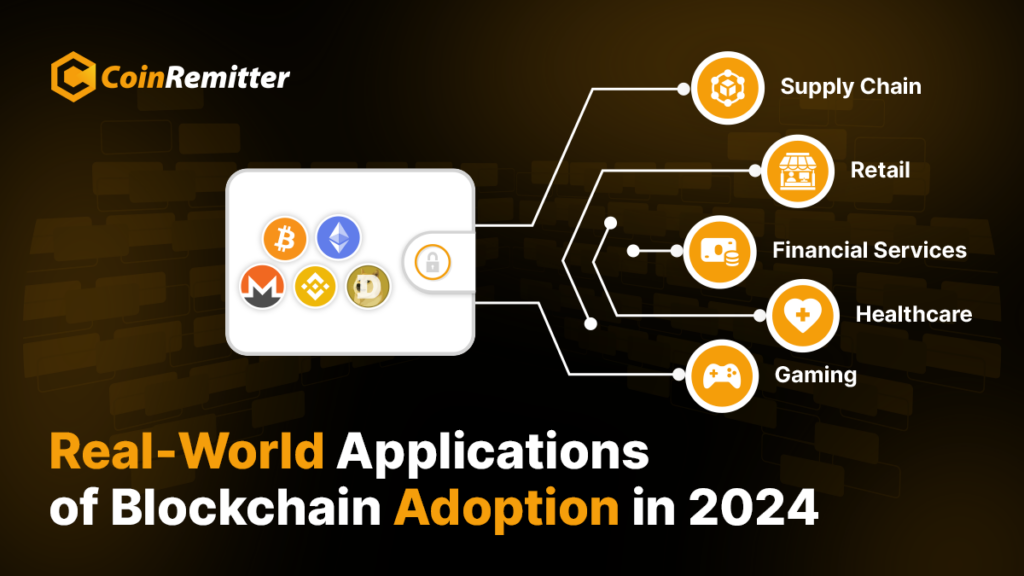The impact of blockchain technology is visible across various industries worldwide. Today, blockchain integration in business is not just a trend but a strategic move. Blockchain’s decentralized nature offers immense opportunities for businesses to streamline their operations and unlock new opportunities to increase their profits. This blog will look at real-world applications of businesses that are integrating blockchain and making an impact in 2024.
Blockchain Technology
Blockchain technology is a decentralized digital ledger that records transactions across multiple computers securely and transparently. Each transaction is added as a “block” to a chain of previous transactions, creating a permanent record. The global blockchain technology market was worth around $17.57 billion in 2023 and by 2030, it is projected to reach $1,431.54 billion with a CAGR of 87.7%.
Benefits of Adopting Blockchain Technology
Automation: Smart contracts on Blockchain can make transactions faster and more efficient by automating them. When certain conditions are met, they automatically trigger the next step in the process. This reduces the need for human involvement and third-party verification.
Traceability: Blockchain creates a record that tracks an asset’s history at every step. This is useful in industries where issues related to a product arise often or where there are problems with counterfeiting and fraud.
Security: Blockchain’s cryptographic nature ensures high levels of security, making it resistant to tampering and fraud. This is particularly beneficial for industries handling sensitive data like healthcare and finance.
Sectors Adopting Blockchain Technology in 2024
Supply Chain:
Complete Tracking: Blockchain allows products to be traced through every step by recording each stage on an unchangeable ledger. Unique digital codes are assigned to products that provide detailed information on their making, handling, etc. in real-time. This brings transparency and trust and enables consumers to choose a product wisely.
Counterfeit Prevention: Counterfeit products are a big problem in many industries, especially luxury goods. Blockchain technology can help prevent this by creating a secure, unchangeable product ownership and authenticity record.
Easy Inventory Management: Blockchain helps stores manage inventory better by keeping a shared, up-to-date record of what’s in stock, where it is, and where it’s going. Products with RFID tags, QR codes, or IoT sensors talk to the blockchain to update inventory automatically. This makes inventory checks more accurate.
Financial Services:
Decentralized Finance (Defi): DeFi has revolutionized the financial market by enabling decentralized access to services, such as lending, borrowing, and trading, without intermediaries. With DeFi protocols, users gain more control over their assets, higher returns, and easier access to financial products.
Cryptocurrencies: Cryptocurrencies are the main use of blockchain in finance, allowing direct transactions between people without middlemen. They offer more accessibility, security, and transparency than fiat (regular) currencies. Blockchain also supports creating and trading digital assets like tokens for stocks, bonds, and commodities.
Central Bank Digital Currencies: Central banks are looking into using blockchain for digital currencies instead of physical cash. These digital currencies could make payments faster, cheaper, and more secure. They also give central banks more control over monetary policies. Many central banks are testing this idea to see if it could work well.
Retail:
Secure Payment Methods: Blockchain makes retail payments safer and simpler by using secure, decentralized systems. This reduces fraud and data breaches. Retailers can accept payments directly from customers using cryptocurrencies and stablecoins on the blockchain. It’s faster, cheaper, and more secure than traditional methods.
Product Authenticity: Blockchain helps retail by confirming if products are real and fighting counterfeits. Each product gets a unique digital code stored on the blockchain, proving it’s genuine. Shoppers can check this by scanning QR codes or NFC tags to see the blockchain record and know they’re getting the real deal.
Enhanced operational Efficiency: Smart contracts on blockchain simplify how contracts work by automatically carrying out terms once conditions are met. For example, when goods are shipped and received, payment is made automatically. Businesses can also use private blockchain networks. These networks give quick access to reliable data for retailers and suppliers.
Healthcare:
Patient Identification: Blockchain improves how patient information and consent are managed by offering secure, decentralized identity solutions. Patients can control their health data, share it safely, and adjust consent settings instantly. This system boosts data security, privacy, and patient involvement.
Health Information Exchange: Blockchain helps healthcare organizations securely share patient data. This reduces administrative tasks and improves how healthcare providers work together. With blockchain, exchanging health information improves patient care, lowers mistakes, and makes healthcare delivery smoother.
Drugs Tracking: Blockchain boosts transparency and accountability in pharmaceutical supply chains by tracking drugs from makers to patients. Each drug gets a unique code on the blockchain for real-time monitoring during shipment. This stops fake drugs, assures quality, and traces drugs better.
Gaming:
Blockchain gaming platforms: Blockchain technology is helping create new gaming platforms that use blockchain’s technical abilities. Platforms like Ethereum and Flow are used to make decentralized games, virtual worlds, and gaming economies. These blockchain-based systems give game developers tools to add blockchain features to their games.
In-Game Payment System: Blockchain helps with payments in games by making them fast and secure using cryptocurrencies or tokenized assets. Players can use blockchain wallets to buy things, pay subscriptions, and do in-game transactions. This makes transactions smooth and helps game makers earn more money.
Play-to-Earn Model: Blockchain has introduced the “play-to-earn” (P2E) model, where players can make real money by playing games. Here, players earn cryptocurrency as they play. Players get tokens for their time and effort in the game, which they can turn into real cash.
Conclusion
In 2024, blockchain technology is disrupting and transforming numerous industries. From supply chain to gaming and beyond, blockchain is enabling more transparent, efficient, and secure processes. As industries are recognizing its benefits, we can expect to see even more impactful use cases soon.

